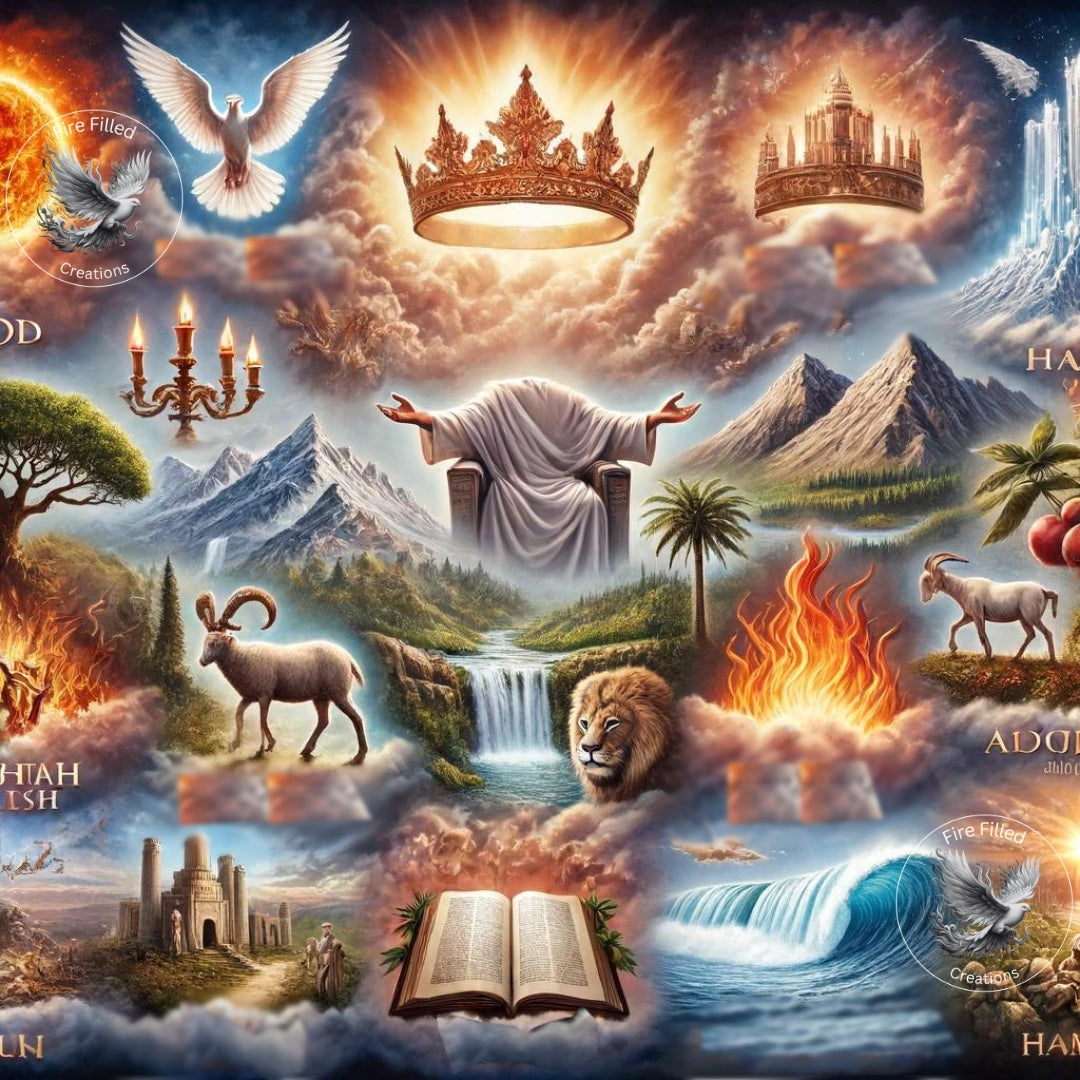
The Names of God
WEEK 1 AND 2:
Exploring the Names of God and Their Manifestation in Believers' Lives
The names of God in the Bible are not merely titles but revelations of His character, nature, and how He relates to His people. Each name unveils a different aspect of God’s identity and His work in the lives of believers. Let's explore these names and understand how God manifests Himself through them.
Elohim (God)
Elohim signifies God as the mighty Creator of the universe. As seen in Genesis 1:1, "In the beginning, God created the heavens and the earth." Believers experience Elohim’s manifestation through the awe-inspiring creation around them, recognizing His power and majesty in every element of nature. This understanding cultivates a deep sense of worship and reverence for God’s creative and sustaining power.
Yahweh (LORD)
Yahweh is God’s personal name revealed to Moses in Exodus 3:14, "I AM WHO I AM." This name reflects God’s eternal, self-existent nature and His covenant relationship with His people. Believers experience Yahweh’s faithfulness and unchanging presence in their lives, providing assurance that God is always with them, guiding and sustaining them through every circumstance.
Adonai (Lord, Master)
Adonai denotes God as Lord and Master. Psalm 8:1 proclaims, "LORD, our Lord, how majestic is your name in all the earth!" This name calls believers to submit to God’s authority and lordship in their lives. It manifests in the believer's willingness to obey God’s commands and trust His sovereign will, leading to a life of purpose and direction under His guidance.
El Shaddai (God Almighty)
El Shaddai emphasizes God’s almighty power and sufficiency. In Genesis 17:1, God introduces Himself to Abram as "God Almighty." Believers see El Shaddai’s manifestation in their lives through God’s provision and strength, especially in times of weakness and need. Trusting in El Shaddai brings peace, knowing that God is more than capable of meeting all their needs.
Jehovah Jireh (The Lord Will Provide)
Jehovah Jireh is revealed in Genesis 22:14 when God provides a ram for Abraham. This name assures believers of God’s provision in their lives. Whether it's financial needs, physical necessities, or spiritual sustenance, Jehovah Jireh manifests Himself by providing for His people, often in unexpected and miraculous ways, reinforcing trust and dependence on Him.
Jehovah Rapha (The Lord Who Heals)
Jehovah Rapha signifies God as the healer, as mentioned in Exodus 15:26. Believers experience this aspect of God through physical, emotional, and spiritual healing. Jehovah Rapha’s manifestation in their lives brings comfort and restoration, reminding them of God’s compassion and power to heal all forms of brokenness.
Jehovah Nissi (The Lord Is My Banner)
Jehovah Nissi was revealed after the Israelites’ victory over the Amalekites in Exodus 17:15. This name symbolizes God’s protection and victory. Believers experience Jehovah Nissi as their banner of victory in spiritual battles, knowing that God fights for them and leads them to triumph over their adversaries.
Jehovah Shalom (The Lord Is Peace)
Jehovah Shalom is God’s name revealed to Gideon in Judges 6:24. It signifies God as the source of peace. Believers find Jehovah Shalom manifesting in their lives through inner peace and tranquility, even amidst chaos and difficulties. This peace transcends understanding and guards their hearts and minds in Christ Jesus.
Jehovah Tsidkenu (The Lord Our Righteousness)
Jehovah Tsidkenu is mentioned in Jeremiah 23:6, highlighting God as our righteousness. Through Jesus Christ, believers are made righteous before God. Jehovah Tsidkenu’s manifestation is evident in the transformed lives of believers who reflect God’s righteousness in their actions, thoughts, and character.
Jehovah Sabaoth (The Lord of Hosts)
Jehovah Sabaoth refers to God as the commander of heavenly armies, as seen in 1 Samuel 1:3. Believers experience Jehovah Sabaoth’s protection and sovereignty in spiritual warfare, knowing that God commands angelic hosts to defend and fight for them, ensuring their victory and safety.
El Elyon (God Most High)
El Elyon denotes God’s supreme sovereignty, as stated in Psalm 57:2. Believers acknowledge El Elyon’s dominion over all creation and experience His supreme authority guiding their lives. This recognition brings comfort, knowing that their lives are in the hands of the Most High God who controls all things.
El Roi (The God Who Sees)
El Roi is the name Hagar used in Genesis 16:13, recognizing God’s awareness of her plight. Believers find solace in El Roi’s manifestation, knowing that God sees and understands their struggles and needs. This assurance of being seen and cared for by God brings immense comfort and encouragement.
El Olam (The Everlasting God)
El Olam highlights God’s eternal nature, as mentioned in Isaiah 40:28. Believers experience El Olam’s unchanging and everlasting presence in their lives, providing stability and hope in an ever-changing world. This eternal perspective helps them trust in God’s timeless plans and purposes.
Jehovah Mekoddishkem (The Lord Who Sanctifies You)
Jehovah Mekoddishkem is revealed in Exodus 31:13, emphasizing God’s role in sanctification. Believers experience this through the ongoing process of being made holy and set apart for God’s purposes. Jehovah Mekoddishkem’s work in their lives results in spiritual growth and a closer walk with God.
Jehovah Rohi (The Lord is My Shepherd)
Jehovah Rohi is beautifully captured in Psalm 23:1, "The LORD is my shepherd; I shall not want." Believers experience God’s shepherding care, guidance, and provision in their daily lives. Jehovah Rohi’s manifestation brings comfort and assurance that God leads, protects, and provides for His flock.
Jehovah Shammah (The Lord Is There)
Jehovah Shammah is found in Ezekiel 48:35, indicating God’s presence. Believers experience Jehovah Shammah’s manifestation through the assurance of God’s constant presence in their lives. This presence brings peace, courage, and confidence, knowing that God is always with them, wherever they go.
These names of God reveal the multifaceted nature of God and His active involvement in the lives of believers. By understanding and embracing these aspects of God’s character, believers can deepen their relationship with Him and experience His presence, power, and provision in profound ways.
